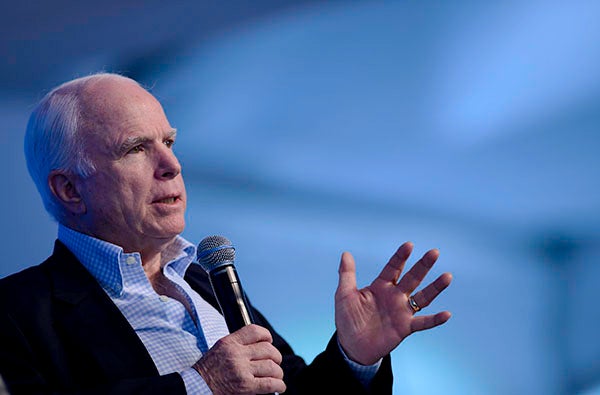*Updated with video from the Hurst Lecture Series.
Speaking at the Aspen Institute Hurst Lecture Series on August 14, Sen. John McCain (R-AZ) harshly criticized the Obama administration’s actions — or lack thereof — in Egypt and Syria, warning that the absence of American leadership could have dire consequences well beyond the Middle East.
McCain, who along with Sen. Lindsey Graham (R-SC) had recently visited Egypt to urge peaceful negotiations between the increasingly warring sides, has been calling the military’s overthrow of the short-lived Muslim Brotherhood’s government a coup, despite the administration’s reluctance to label it as such.
In conversation with the Institute’s Elliot Gerson, McCain put the blame squarely on the United States’ shoulders for a situation that’s becoming increasingly bloody.
“The chance for peaceful resolution has diminished dramatically, and the United States, because of a lack of leadership in my view, has contributed to that terrible tragedy.”

The United States should have followed its own law and canceled aid to Egypt after the coup, said McCain. But because Secretary of State John Kerry (whom McCain called a friend) “thanked them for restoring democracy, I believe the Egyptian military thought they had a free hand.”
McCain warns of “bloodletting in the streets that will continue for some time,” and foresees the Egyptian situation as being similar to the decade-long Algerian uprising, during which “weapons will flow all over the Middle East” and violence will continue to spread.
The former naval aviator was even more critical of the Obama administration’s lack of action against Syria. McCain praised Kerry’s efforts toward an Israeli-Palestinian deal, agreeing the issue is of vital importance. But McCain called attention to another regional issue, saying, “Syria is a crisis of monumental proportions and this country is standing by and watching.”
McCain visited refugee camps in Turkey and Jordan, meeting with people who had been raped and tortured, and was told that the displaced children will someday “take revenge on the people who refused to help them,” he said. He faulted Obama for not making good on his threat to take action against Syrian President Bashar al-Assad for using chemical weapons against his people. And he reiterated that — in contrast to the US military’s opinion — a handful of simple air strikes on key targets, such as airfields and fuel supplies, could cripple the government’s military campaign.
The Syrian uprising is leading to a regional conflict, said McCain, adding that the governments of Jordan and Lebanon are almost certain to fall.
“The whole region is about to be engulfed in conflict and there is no American leadership,” he said. “I’m no longer angry as much as I am sad.”
Acknowledging that Americans are “war weary” and that he doesn’t want to have to send troops everywhere, McCain insisted that the United States’ role is to lead, and that when it doesn’t, it creates a vacuum into which a power, such as Iran or Al-Qaeda, can exert influence. He pointed to Iraq, which he says is “unraveling” without a residual American military force, and gave the example of what happened in Nazi Germany when the United States didn’t get involved in World War II right away.
“It’s going to get a lot worse and it’s not in America’s national security interest to see the Middle East engulfed in conflict,” he said.
McCain downplayed the struggle between the isolationists and internationalists in the Republican Party, arguing that there’s always been an isolationist element and that it’s never gotten any bigger than about 12 percent.
He touched on his ongoing campaign for immigration reform — which 70 percent of Americans support, he noted — and said that he still remains hopeful that legislation can come from the House of Representatives that can be debated and negotiated. And he expressed his displeasure at the across-the-board budget cuts that were made earlier this year, noting that firefighting funding will be reduced dramatically even as wildfires are becoming more numerous and deadly (he pointed to the Yarnell fire in his home state of Arizona that killed 19 firefighters as an example).
McCain also cracked a few jokes. At the outset of the conversation, he drew laughs when he said, “On behalf of the citizens of Arizona, thanks for the water.” He was referring to the Colorado River Compact, in which states in the upper basin, including Colorado, provide much of the water for states in the more arid lower basin, such as Arizona.
More than once he joked about his failed presidential bid. “After I lost, I slept like a baby: sleep two hours, wake up, and cry,” he quipped.
And, in reference to the vast array of information sources Americans have in this digital age, he added, tongue in cheek: “And of course we have Fox News, fair and balanced.”

